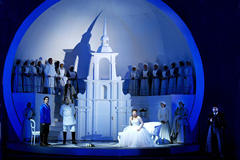| Opera Reviews | 19 April 2024 |
A double bill delivered with distinctive Russian flairby Moore Parker |
|
| Tchaikovsky: Iolanta Rachmaninov: Francesca da Rimini Theater an der Wien 27 January 2012 |
|
|
Iolanta, which scored a success in concert form last season at the Salzburg Festival, opened the evening in a fairy-tale setting of white, which aptly reflected the shielded world of the blind heroine. Her red petticoats, incidentally, nicely complimented the red roses and their significance in the plot. Less effective was the enormous Soyuz-like capsule (which appears alternately on a revolving platform, and which later forms the basis of the Francesca set) with its awkward options for the protagonists' comings and goings. The female leads in Iolanta manage to convince more successfully than their male counterparts, who too often come across as rather stilted and unpolished in their stage work. Those operating in the bass clef seemed generally intent on impressing through sheer vocal power and stamina, unquestionable assets at times, but wearing over the course of an entire evening. René was sung by Dmitry Belosselsky, Robert von Burgund by Dalibor Jenis, Bertrand by Vladimir Baykov, and Ibn-Hakia by Elchin Azizov. I more enjoyed Ladislav Elgr's understated Alméric (Iolanta), as well as his Dante in Francesca. Saimir Pirgu's Gottfied von Vaudemont came across as romantic and sincere - at times oddly reminiscent of Giuseppe di Stefano in looks and delivery. In the title role Olga Mykytenko charmed with her sympathetic presence and unaffected vocalisation, permeated with ample light and shade and adequate volume to fill the house with ease. Her Martha, sung by Svetlana Shilova, also refrained from overindulgence while leaving no doubt as to her potential vocal prowess. The minor female solos of Brigitta and Laura were neatly taken by Rinnat Moriah, and Victoria Yarovaya. Barbora Kohoutkova made the best of the rather displaced dance sequence which accompanied Robert von Burgund's aria. The rotating globus and a brightly-lit red star reappeared after the interval - this time augmented by a rather effective system of gangplanks, allowing multi-directional mobility for solo and crowd-scenes alike. The oppression meted out by Ushanka-hatted armed guards depicts Purgatory, while Francesca slips from her elegant evening gown into boots and a leather jacket fit for any modern high street as she heads to her tryst with Paolo. Several of the Iolanta leads returned - with (as already mentioned) Elgr portraying Dante; Belosselsky (better-suited here to the hectoring, embittered Malatesta); Baykov (Vigil's Ghost), and with Pirgu and Mykytenko both passionate and credible as Paolo and Francesca. An asset to any production, the Arnold Schoenberg Choir sang and acted with aplomb and indeed formed the backbone of this part of the evening's programme. All-too-often Vassily Sinaisky seemed intent upon drawing every possible decibel out of the ORF Radio Symphony Orchestra, but the coordination between stage and pit seemed to flow without a mishap. Stephen Lawless was responsible for the direction, with sets costumes, choreography and lighting by Benoit Dugardyn, Jorge Jara, Lynne Hockney, and Patricia Collins. |
|
| Text ©
Moore Parker Photo © Armin Bardel |

 This
double-bill is worth a viewing - if only for the opportunity of seeing
two rarities in an exotic combination of cast and staging with a distinctive
Russian flair.
This
double-bill is worth a viewing - if only for the opportunity of seeing
two rarities in an exotic combination of cast and staging with a distinctive
Russian flair. 





